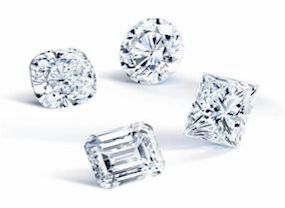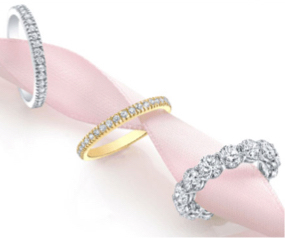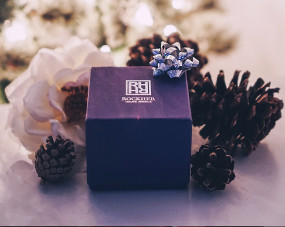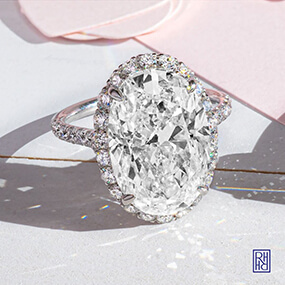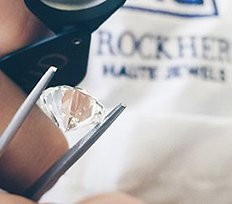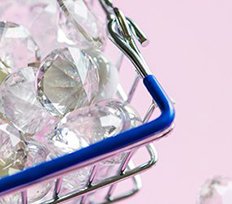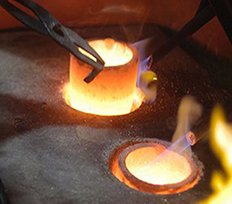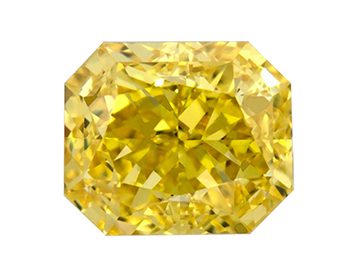
Canary Yellow Diamond Buyer's Guide
Like sunshine on a summer day, fancy yellow diamonds have all the brilliance and fire of white diamonds with a fresh squeeze of juicy lemon color. Fancy colored diamonds are rare and luxurious as well as beautiful: only one in 10,000 diamonds qualifies as fancy color.
Fancy yellow diamonds, despite their rarity, are surprisingly affordable. You can choose a fancy yellow diamond, also called canary diamonds, for a price that’s similar to a colorless diamond but it’s much more unique. That’s why fancy yellow diamonds are becoming popular with diamond connoisseurs. Fancy yellow diamonds are also starring on the red carpet as celebrities look for more unusual jewelry to express their personal style.
Fancy yellow diamond engagement rings are also becoming more popular. Celebrities with fancy yellow engagement rings include Nicki Minaj, Iggy Azalea, Kelly Clarkson, Heidi Klum, and Carrie Underwood. It’s easy to see why: even a classic engagement ring setting becomes unique with a yellow diamond.
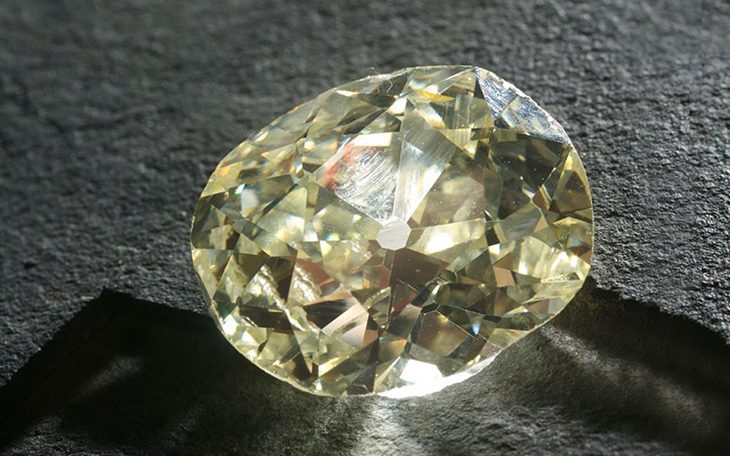
The Eureka Diamond, a yellow diamond that is the first diamond discovered in Southern Africa
The History and Meaning of Yellow Diamonds
Fancy yellow diamonds are a symbol of joy, optimism and prosperity. A gift of a yellow diamond means you will have a long happy future, which makes them a meaningful engagement ring choice.
Fancy yellow diamonds are a rare subset of the most common kind of diamonds, known as the Cape Series, or type 1a. These diamonds have traces of nitrogen in their crystal structure. Fancy yellow diamonds have more nitrogen in their composition than colorless diamonds. The nitrogen absorbs blue light, making the stone appear yellow.
A little nitrogen and they might be an H or L color. But diamonds with more nitrogen become increasingly yellow until it becomes an asset, not a liability. Fancy yellow diamonds with the brightest yellow shades, fancy intense yellow and fancy vivid yellow, were historically known as Canary Diamonds.
Yellow diamonds are found all over the world. But the reason these diamonds are called the Cape series is that they are found most often in Southern Africa. In fact the first diamond discovered in Southern Africa was a yellow diamond.
In 1867, a 15-year old farmer’s son named Erasmus Stephanus Jacobs found a pretty pebble near the Orange River in the British Cape Colony in Africa. The 21-carat rough yellow diamond was cut into the 10.73-carat Eureka Diamond. The Eureka Diamond is now on display in the Mine Museum in Kimberley, South Africa. The discovery sparked a diamond rush and this one yellow diamond led to millions more carats.
Cecil Rhodes established De Beers Consolidated Mines 22 years later in 1888 and modern diamond mining began. By 1900 De Beers mines in South Africa produced 90 percent of the world’s diamonds.
The diamonds from South Africa, which were originally called Cape Diamonds, were faint to light yellow in color. Over time, diamonds in the yellow spectrum began to be called Cape Diamonds, no matter where they were mined.
The world’s most famous yellow diamond is the Tiffany Diamond. Discovered in the Kimberley diamond mine in South Africa in 1877, the 287.42-carat diamond was purchased by Charles Lewis Tiffany for $18,000.
The rough stone was cut and polished in Paris into a 128.54-carat cushion shape diamond with 82 facets—24 more facets than the traditional 58-facet brilliant cut. The Tiffany Diamond is just over an inch wide and seven-eighths of an inch from top to bottom.
The Tiffany Diamond toured the world, winning acclaim at the 1893 World’s Colombian Exposition in Chicago and the 1939 World’s Fair in New York. The Tiffany Diamond travelled to South Africa for De Beers’ 100th anniversary celebration in Kimberley in 1971.
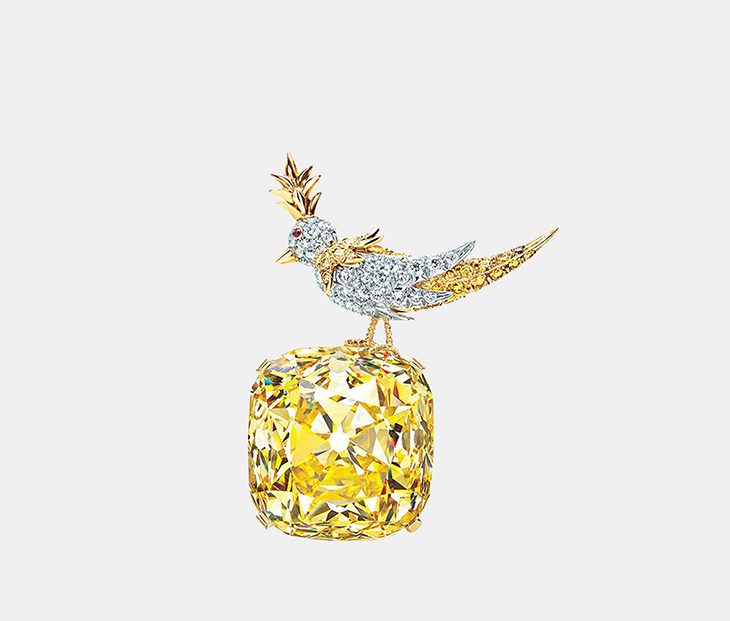
The Tiffany Diamond has had many settings including the whimsical “Bird in a Rock” setting by Jean Schlumberger. For Tiffany’s 175th anniversary in 2012 the Tiffany Diamond was reset in a magnificent necklace featuring 100 carats of white diamonds.
The Tiffany Diamond has been worn in public only three times, most famously by Audrey Hepburn to promote “Breakfast at Tiffany’s.” Most recently, Lady Gaga wore the Tiffany Diamond Necklace to the Oscars in 2019.
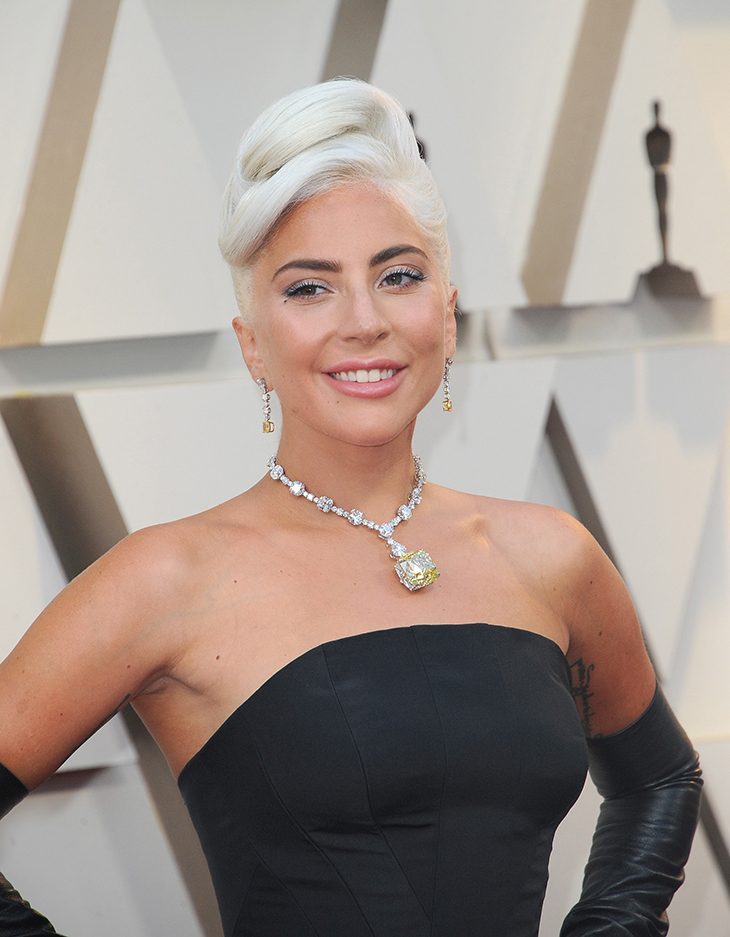
Seventh on the list of the world’s largest diamonds is the Incomparable Diamond. In 1984, a young girl discovered a fancy deep brownish yellow diamond weighing 890 carats in the tailings of the MIBA Diamond Mine in the Democratic Republic of the Congo. The diamond was cut into an unusual elongated triangular drop weighing 407.38 carats named The Incomparable. In 2013, Mouawad Jewelers set the Incomparable Diamond into a 367-carat diamond necklace which is listed in the Guinness World Records as the world’s most expensive necklace, with a price tag of $55 million.
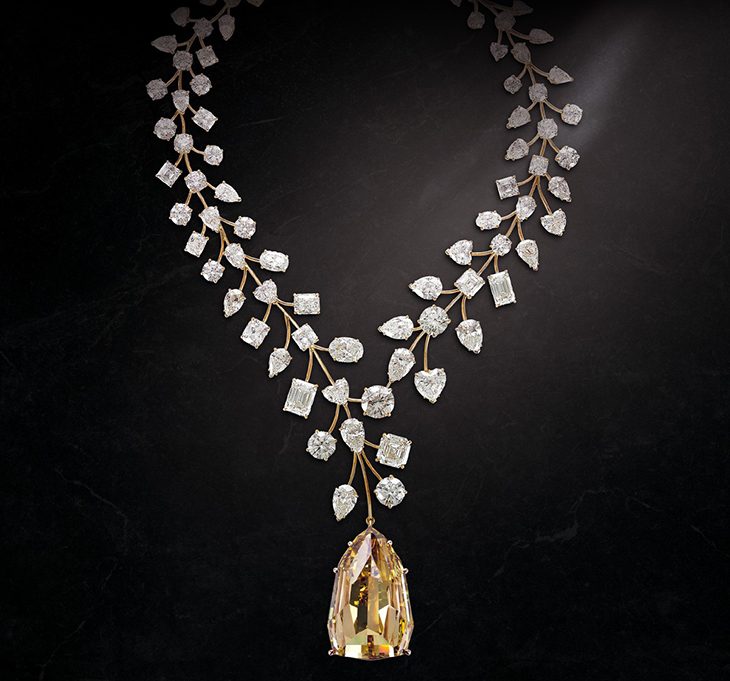
Another famous fancy yellow diamond is the 110.03 carat fancy vivid yellow Sun Drop Diamond, which sold at Sotheby’s for $12.4 million in 2011, setting a world record price for a fancy yellow diamond.
How to Buy Fancy Yellow Diamonds

When buying a fancy yellow diamond, the most important quality factor to consider is the color. While colorless diamonds are graded by the absence of color from the completely colorless D to the noticeably tinted Z, yellow diamonds begin beyond Z.
The GIA color grading scale for yellow diamonds calls diamonds that are more yellow than a Z diamond Fancy Light Yellow Diamonds. More saturated yellow is called Fancy Yellow, even more saturated yellow is called Fancy Intense Yellow and the most saturated is called Fancy Vivid. A yellow that is deeper in tone will be described as Fancy Deep Yellow Diamond.
Although pure natural yellow diamonds of an intense shade are sometimes referred to as Canary Diamonds or Canary Yellow Diamonds, GIA does not use this term on its grading reports.
Yellow diamonds can also have a secondary hue, most commonly green yellow, orange yellow, or brown yellow. The last color mentioned on a GIA report is the dominant color. The GIA uses an adjective for the color when the secondary color is slight and a noun for the color when it is more apparent. So an orangy yellow diamond is primarily yellow with a slight modifying tone of orange but an orange yellow diamond, although still primarily yellow, has a more noticeable orange tint. Small differences in color can result in large price differences. Yellow diamonds with orange and green secondary colors are worth more than yellow diamonds with no secondary colors. Yellow diamonds with brown secondary colors are worth less.
That’s why it’s so important to have a GIA Colored Diamond Grading Report. GIA has graded virtually every significant fancy colored diamond on the market: only GIA’s description of a fancy diamond’s color is trusted by the market when it comes to pricing fancy colored diamonds.
Having a report from GIA also confirms that a yellow diamond’s color is natural, that the diamond hasn’t been treated and that that the diamond is not laboratory grown. Many yellow diamonds have a relatively high clarity. That means it should be possible to find an eye clean yellow diamond with a color you like.
Unlike colorless diamonds, which are most often cut into round brilliant cuts, yellow diamonds are most often found in fancy shapes like oval cuts, cushion cuts, radiant cuts, pear shapes, and emerald cuts. That’s because the round brilliant cut tends to dilute the color of yellow diamonds.
Fluorescence can reduce the value of yellow diamonds. Strong fluorescence can reduce the price as much as 25%. These diamonds can represent a value if your only concern is a beautiful engagement ring and not an investment.
And here’s the surprising thing: fancy light yellow diamonds are priced similarly to an H-I color grade colorless diamond. A fancy yellow diamond is similar to an F color grade colorless diamond. You can have something rare and unusual for about the same as a standard colorless diamond engagement ring.
Fancy Intense yellow diamond engagement rings command a premium over colorless diamonds, perhaps as much as 50 percent. Fancy vivid yellow diamond engagement rings are even more rare and are much more valuable.
Best Yellow Diamond Engagement Ring Styles
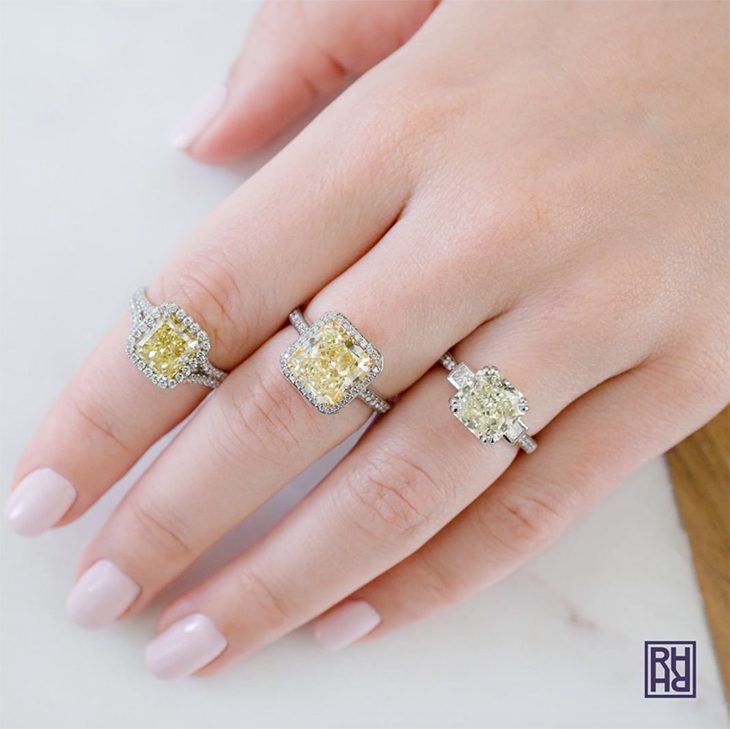
The style of your engagement ring setting can make your yellow diamond look more or less yellow. Even if your diamond is fancy light yellow, you can make the color look more saturated by doing two things. First, surround the diamond with yellow gold prongs or a yellow gold bezel. The entire basket that holds the diamond should be yellow gold if possible. Then accent the ring with bright white diamonds in white gold or platinum. The reflection from the yellow gold, combined with the contrast with the white diamond in platinum or white gold, makes a paler yellow diamond look more intense.
The contrast effect means that halo yellow diamond halo engagement rings are a popular choice. Three-stone engagement rings with a yellow diamond center stone and white diamond side stones are another way to add contrast and make the color of your yellow diamond look richer.

